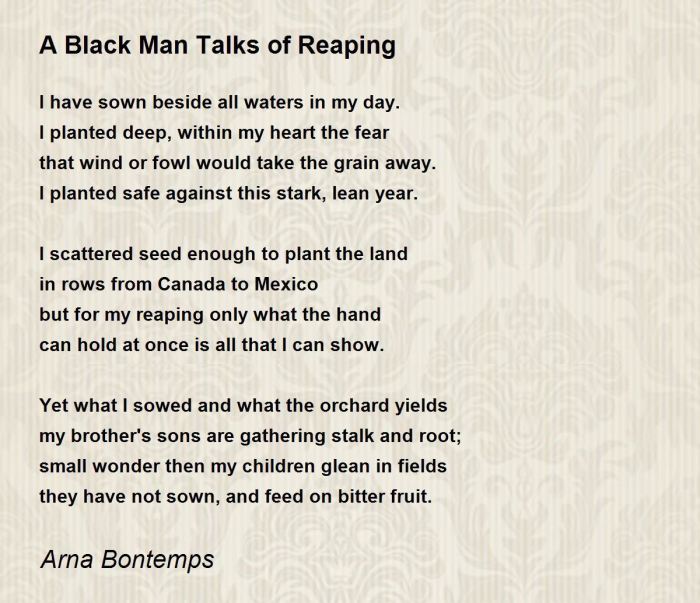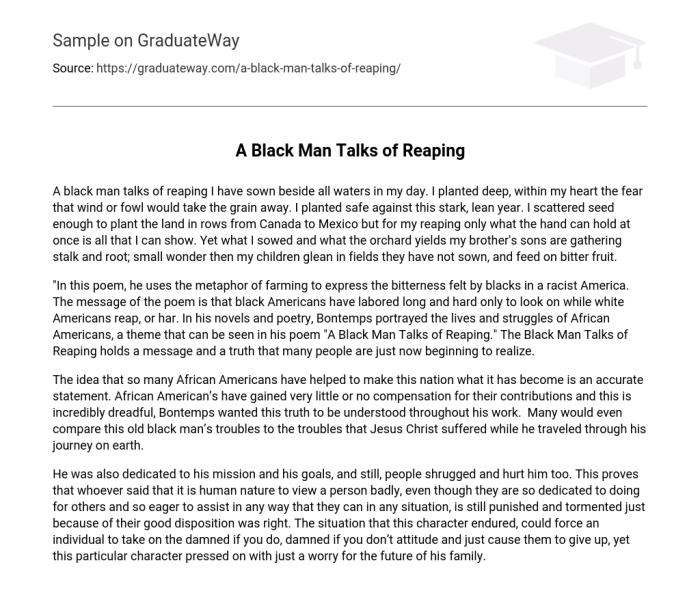As the sobering topic of “A Black Man Talks of Reaping Analysis” takes center stage, this discourse delves into the profound experiences and perspectives of a Black man, unveiling the deeply rooted consequences of reaping within the African American community.
Through a meticulous examination of historical and contemporary manifestations, this analysis unravels the intricate tapestry of social, economic, and psychological implications that reaping has woven into the fabric of Black lives.
Black Man’s Perspective on Reaping

The concept of reaping, or experiencing the consequences of one’s actions, holds profound significance for Black men in America. Historically marginalized and subjected to systemic oppression, their lived experiences shape their unique perspective on this fundamental principle.
Emotions and Experiences
For Black men, reaping is often intertwined with feelings of frustration, anger, and disillusionment. They may perceive themselves as reaping the consequences of actions committed by others, such as the legacy of slavery, discrimination, and racial profiling. This can lead to a sense of injustice and resentment, as they feel their own efforts and contributions are often overlooked or undervalued.
Motivations
Despite these challenges, Black men are driven by a strong sense of resilience and determination. They recognize the importance of reaping the benefits of their hard work and perseverance, even in the face of adversity. This motivation fuels their efforts to overcome obstacles and achieve their goals, both individually and collectively.
Personal Narratives
Personal narratives of Black men offer valuable insights into the broader issue of reaping. They highlight the complexities of their experiences and the ways in which they navigate the challenges of living in a society that often devalues them. By sharing their stories, Black men can raise awareness, challenge stereotypes, and inspire others to confront the systemic issues that perpetuate inequality.
Historical Timeline of Reaping in the United States

Reaping, the act of harvesting crops, has a long and complex history in the United States. From the early days of European colonization to the present day, the practice of reaping has been shaped by a variety of factors, including technological advancements, economic conditions, and social movements.
The following table provides a historical timeline of key events, legislation, and social movements that have shaped the issue of reaping in the United States:
| Date | Event | Significance | Impact |
|---|---|---|---|
| 1607 | Establishment of the Jamestown colony | The first permanent English settlement in North America | Introduced European farming practices to the New World |
| 1794 | Eli Whitney invents the cotton gin | Revolutionized the production of cotton | Led to the expansion of slavery in the South |
| 1830 | Indian Removal Act | Forced the relocation of Native American tribes from their ancestral lands | Freed up land for cotton cultivation |
| 1861-1865 | American Civil War | Fought over the issue of slavery | Ended slavery and led to the emancipation of African Americans |
| 1865 | Thirteenth Amendment to the Constitution | Abolished slavery | Gave African Americans the right to own land and farm |
| 1867 | Establishment of the Freedmen’s Bureau | Provided assistance to newly freed slaves | Helped African Americans to establish farms and become self-sufficient |
| 1877 | End of Reconstruction | Marked the end of federal government support for African Americans | Led to the rise of Jim Crow laws and the disenfranchisement of African Americans |
| Great Depression | Caused widespread economic hardship | Led to a decline in agricultural production | |
| Agricultural Adjustment Act | Provided financial assistance to farmers | Helped to stabilize agricultural production | |
| World War II | Increased demand for agricultural products | Led to a boom in agricultural production | |
| Civil Rights Movement | Fought for the rights of African Americans | Led to the passage of the Civil Rights Act of 1964 and the Voting Rights Act of 1965 | |
| Farm Crisis | Caused widespread economic hardship for farmers | Led to a decline in agricultural production | |
| Reagan Administration | Implemented policies that favored large-scale agriculture | Led to a further decline in small farms | |
| North American Free Trade Agreement (NAFTA) | Created a free trade zone between the United States, Canada, and Mexico | Led to a decline in agricultural production in the United States | |
| Global Financial Crisis | Caused widespread economic hardship | Led to a decline in agricultural production | |
| Sustainable Agriculture Movement | Promotes environmentally friendly farming practices | Has led to a growing interest in small-scale farming |
Recommendations for Addressing Reaping in the Black Community: A Black Man Talks Of Reaping Analysis

Reaping remains a pervasive issue in the Black community, perpetuating cycles of poverty, trauma, and inequality.
To effectively address this systemic problem, a comprehensive approach is necessary. The following recommendations aim to combat systemic racism, promote economic empowerment, and foster social justice:
Combating Systemic Racism
- Enact and enforce anti-discrimination laws to prevent bias in housing, employment, and criminal justice.
- Reform the criminal justice system to reduce racial disparities in arrests, convictions, and sentencing.
- Address implicit biases in institutions and organizations through training and awareness campaigns.
Promoting Economic Empowerment
- Provide affordable housing and homeownership assistance to increase financial stability.
- Invest in education and job training programs to improve employment opportunities and earning potential.
li>Support Black-owned businesses through access to capital, mentorship, and procurement opportunities.
Fostering Social Justice, A black man talks of reaping analysis
- Promote restorative justice practices to address trauma and build community resilience.
- Increase representation of Black voices in decision-making bodies and leadership positions.
- Educate the public about the history and impact of reaping to foster understanding and empathy.
Implementing these recommendations has the potential to significantly reduce the prevalence of reaping in the Black community. By addressing the root causes of inequality, creating opportunities for economic advancement, and promoting social justice, we can break the cycle of poverty and trauma that has plagued generations.
Common Queries
What is the significance of the concept of reaping in the African American experience?
Reaping refers to the cumulative effects of historical and ongoing systemic racism, discrimination, and oppression faced by Black Americans, leading to persistent disparities in various aspects of life.
How does reaping manifest in contemporary times?
Reaping continues to manifest in contemporary society through racial profiling, police brutality, unequal access to education, healthcare, and housing, and the perpetuation of negative stereotypes.
What are the potential solutions to address reaping in the Black community?
Addressing reaping requires a multifaceted approach, including combating systemic racism, promoting economic empowerment through job creation and entrepreneurship, and fostering social justice through policy reforms and community-based initiatives.

